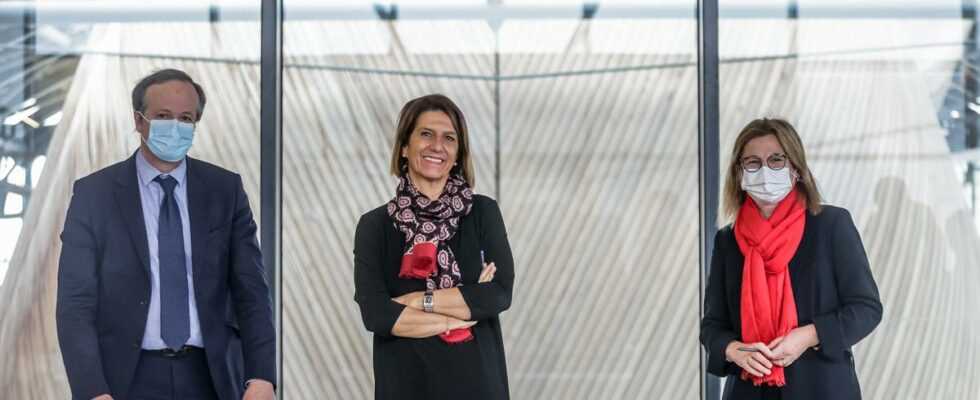Chance of the calendar, one year after the outbreak of a vast movement for the liberation of speech in the student community, the director of Sciences-Po Bordeaux, the public prosecutor and the rector of the academy co-signed this Thursday, January 27, at the courthouse, a convention to combat sexist and sexual violence. Under the apparent institutional varnish, the document echoes a national phenomenon relayed here, at Sciences-Po, in the wake of a student who…
Chance of the calendar, one year after the outbreak of a vast movement for the liberation of speech in the student community, the director of Sciences-Po Bordeaux, the public prosecutor and the rector of the academy co-signed this Thursday, January 27, at the courthouse, a convention to combat sexist and sexual violence. Under the apparent institutional veneer, the document echoes a national phenomenon relayed here, at Sciences-Po, in the wake of a student who had described her rape on a Facebook group on January 23, 2021.
Dozens and dozens of testimonies had accumulated on the social network, closed to the general public but shared by thousands of students. Street harassment, sexual assault, even rape, so many variations of non-consent reported frankly by the victims, mostly women, over a period covering the previous ten years: the feminist student association Sexprimons-nous had then identified more than 150 messages in ten days, most relating to situations experienced outside the walls of the Institute of Political Studies (IEP).
Under “our radar screens”
18, however, recounted rape or sexual assault experienced during the year of mobility spent abroad, 16 referred to “aggressors within the IEP” and 5 pointed to the absence of a return from the administration of the IEP. school. Caught up – and shaken – by events, it had nevertheless been equipped since 2018 with a “watch and listening cell”: twenty cases, including seven for sexual violence, were thus reported, giving rise in particular to the dismissal of an agent for harassment of a doctoral student.
But, obviously, many cases had passed “under our radar screens”, as a Sciences-Po teacher said in February 2021. Director of the IEP since last summer, Dominique Darbon puts in the balance of this agreement “a long process of reflection on this gender-based and sexual violence” undertaken for “more than two years”. But also, he agrees first, “the observation that we were not really well prepared to respond to it. »
“More effective discernment”
“It’s extremely complicated to deal with this kind of business,” he continues. “We found that our skills were insufficient. We have multiplied the bodies, we have developed processes, in particular with all IEP directors, to acquire means of action, including comparative ones, to deal with cases, and to avoid causing additional suffering through a form of ‘inaction, inappropriate treatment, misinterpretation of situations’, all in the service of ‘more effective discernment’.
And to recall that the IEP has only a “partial competence” in the matter, through its disciplinary commission, whose temporality is not that of justice. The agreement notably enacts “training support for the court” and, if necessary, the reinforcement of “legal advisers from the rectorate”. It constitutes, according to Dominique Darbon, an additional element in the “arsenal” of measures taken, “the collective effort for which we absolutely need to have the support of State services”: “It seems to me that there are significant safeguards”.
At the start of the school year, “all first-time students” benefited from awareness-raising on gender equality, not to mention the “heads of associations and sports teams” who were offered workshops. The monitoring and listening cell “is called upon, and it is in the order of things”, adds Emmanuel Nadal, director general of the services of the IEP, anxious to establish a “climate of trust”. To date, “two disciplinary procedures” are underway within Sciences-Po, the outcome ranging from reprimand to exclusion.
“A Gateway to Jurisdiction”
The first document of its kind signed in New Aquitaine, this agreement, which is in fact part of a national action plan against sexist and sexual violence in higher education, is assigned three objectives: the prevention risk behavior and sexual abuse through training, an “efficient” consideration of sexual offenses within Sciences-Po and, if necessary, the facilitation of their reporting to the public prosecutor’s office, in this case via a lawyer who will act as “gateway to the jurisdiction”, lists Frédérique Porterie, public prosecutor. “It’s a beginning and not an end,” warns Anne Bisagni-Faure, rector of the Nouvelle-Aquitaine Academy.
